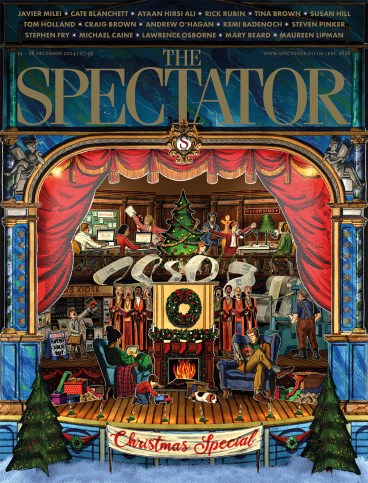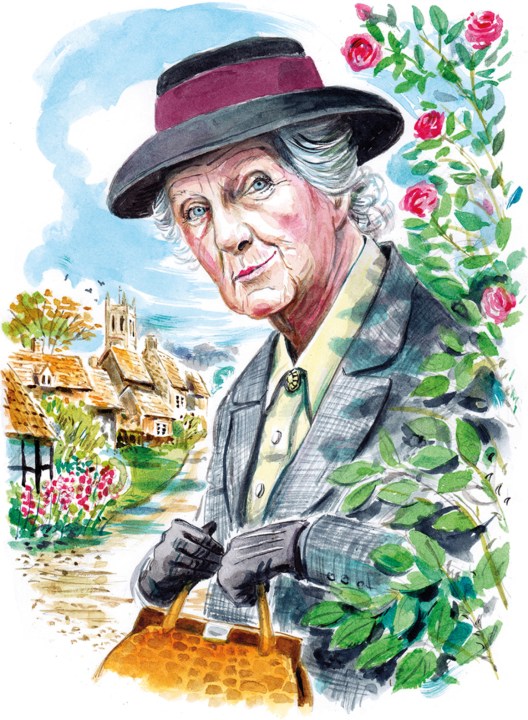
There’s a big difference between being a fan and being a super-fan. Not all fans would be able to differentiate between the two, but every super-fan understands, at a bone-deep level, the difference between themselves and those of their ilk (fellow super-fans) on the one hand and regular fans on the other.
The unforgettable theory that it’s the weak characters who do the most damage appears in a Marple novel
For example, I am a big fan of Richard Curtis’s 2013 movie About Time. I love it, recommend it to people and think it’s one of the best stories of both romantic and familial love that I’ve ever come across, as well as thoroughly inspiring from a ‘How to live a better life’ point of view. However, since I am merely a fan rather than a super-fan, I don’t feel I need to know what kind of cameras were used to film it or which actors were originally cast in different roles. Only super-fans crave that level of detail, and –like most of us, I hope, given the time and obsession levels involved – I am a super-fan of very little.
It’s a very special ‘very little’ (I would say that, of course) and top of the list is the work of Agatha Christie – which means that whenever another member of the Agatha super-fans gang publishes a book, I rush to read it.
Dr Mark Aldridge, the author of Agatha Christie’s Marple: Expert on Wickedness is a fully fledged, 24ct, top-tier Agatha super-fan, too. Can I prove this? Well, his two previous books were called Agatha Christie’s Poirot: The Greatest Detective in the World and Agatha Christie on Screen. Each of them is wonderful, but I enjoyed his exhaustive investigation into all things Marple most.
When I first settled down to it, I didn’t know Miss Marple quite as well as I’ve come to know Hercule Poirot. I do now, of course, thanks to this brilliant book, which invites us to read it either from cover to cover or by dipping in and out, whichever we would prefer. I’m going to recommend the dipping-in-and-out approach, but with a twist that I will come to in due course. We can’t have a Christie-themed review without a cliffhanger, can we?
Aldridge’s encyclopaedia of Marple moreishness examines, with meticulous rigour and irresistible enthusiasm, the short stories, novels and screen adaptations which features Jane Marple, the elderly, white-haired spinster detective. As well as giving us the facts and gossip about every single Marple outing, Aldridge puts forward some fascinating theories about Christie and her intuitive female sleuth, including this:
Although she did not fit the definition of ‘spinster’, having been married and had a child, for a while Christie saw her future as a single woman, and perhaps Miss Marple was an indication of her optimism for this new course of her life.
This and other equally compelling hypotheses – Aldridge’s opinions as a true Christie expert – were my favourite aspects of the book. Also joyous were the sections about each Marple novel in turn (I love all of Christie’s work, but nothing beats the novels). Some of Christie’s very finest books are Marple mysteries. They are The Body in the Library, which I controversially believe to be flawless and the best Marple novel; The Murder at the Vicarage, a sparkling tale of village life in which the machinations of the doctor, the vicar and various spirited spinsters are at least as interesting as the crime element, if not more; A Murder is Announced, which contains the author’s best ever hook (Arguably? Definitely? I’m happy to discuss this with other Christie super-fans till the end of time), as well as the unforgettable theory that it’s weak characters who do the most damage, not strong ones; Nemesis, which has a plot opening that only the most confident genius could pull off: Miss Marple is given a posthumous order by an old friend to investigate nothing in particular and find something he refuses to describe.
Even the less legendary Marple novels are utterly marvellous in their way – They Do It With Mirrors, in which a do-gooder’s determination to force reality to comply with his ideals has devastating consequences; and the wonderful atmosphere and gentle joys of At Bertram’s Hotel, of which I can’t recall the plot details but vividly remember the way it is infused with love for a familiar hotel one has visited many times.
All of which brings me to my suggestion for the best way to approach Aldridge’s book. I’ll admit I haven’t had the time to do this myself, but in an ideal world I would have reread every Marple mystery before reading Aldridge’s take on them. To me, that sounds like a recipe for pure bliss.
But then I’m a super-fan. And I know I don’t need to convince any of my fellow super-fans to buy Agatha Christie’s Marple. They’ll all have done so the day it was published. However, some of you reading this might be regular Agatha fans, or might have loved ones who enjoy the odd Christie mystery but aren’t yet ready to drop everything and become zealots.
Don’t worry: help is at hand. This book would be the perfect Christmas present for anyone who needs to become… let’s call it ‘more properly invested’ in the brilliance of Agatha Christie and Jane Marple. Such people might start reading the book with contented interest, planning to stop after a chapter or two, but within 80 pages or so they’ll be frantically grabbing you by the arm, demanding to know how much you think it matters that the genius high-concept motive in The Mirror Crack’d From Side to Side is slightly undermined by the underplayed delivery of that solution by the time of the denouement.
This is a book that will not only thrill existing super-fans but which also has the power to create more of them. Or more of us, I should say. Give it a few chapters and I promise that you will want to join us in the land where all good books have the words ‘Agatha Christie’ on the title page.








Comments